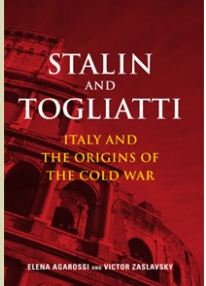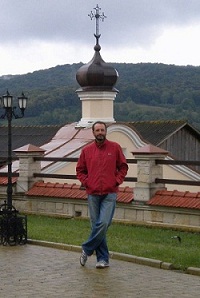deadline : 1 June 2018
International Scholarly Conference
SOVIET ENCOUNTERS WITH WEST AND EAST
27-28 November 2018, Moscow
Organizers
International Center for the History and Sociology of World War II and Its Consequences
National Research University – Higher School of Economics (Moscow)
The Friedrich Ebert Foundation
With additional support from the Blavatnik Family Foundation
Call for Papers
The Soviet Union presented itself as a distinct civilization that was radically different from its capitalist surroundings. Soviet propaganda advanced the image of Soviet Russia as a besieged fortress and encouraged the proliferation of xenophobia and intolerance, both of which became the flip side of Soviet internationalist ideology. Nevertheless, despite the regime’s largely isolationist nature, Soviet contacts with the West and wider world never ceased. Western engineers, for example, participated in the Soviet industrialisation efforts. Fellow-travellers from around the world visited the USSR and popularised its achievements abroad. World War II brought large segments of Soviet population into immediate contact with the German occupiers, but also with lend-lease sailors and the Allied military. Later – when the Red Army marched to Europe – millions of Soviet people could see European countries for the first time and come into contact with their populations. Even during the ensuing Cold War, the Iron Curtain proved to be porous and permeable allowing for cultural exchange, tourism, and the organization of international festivals and exhibitions. No less importantly, throughout its existence the Soviet Union also maintained and developed connections with the non-Western world, often referred to as the East, where it first hoped to spread communism after the revolutions in Europe had failed, and with which it had uneasy relationships through the rest of the century. It also developed contacts with colonized and then decolonized non-European countries of the South.
What impact did these encounters have on Soviet culture, society, economy, and politics? How did these contacts with West and East affect the Soviet people’s perceptions about their own regime and about other countries? How did these perceptions change over time? In which way did these international encounters shape the Soviet regime itself, and how did they affect other countries? How can we juxtapose Soviet interactions with Europe or the US and its encounters with China or the countries of the Middle East? Finally, what new perspectives on Soviet history can we gain by analysing Soviet contacts with the West, but also with the East and the wider world?
We do not expect to present a monochromatic history of Soviet encounters with the West and the East; both were as much ideological and cultural constructs as really existing entities. They were made up of numerous diverse national historical trajectories that in turn had very different relationships with the USSR. In a similar vein, the international encounters involved many participants – from political leaders and ideologists to organized groups, individuals, and local actors – who all had very different experiences. At the conference, we are planning to discuss the multiplicity of these experiences together with broader ideological perceptions that shaped Soviet transnational contacts.
The conference aims to examine the significance and role of the encounters with the West and the wider world in Soviet history, from the Revolution through Perestroika. We will discuss these encounters from the perspectives of cultural, social, economic and political history to gain a new understanding of the complex relationships between the Soviet Union and the outside world. We invite creative responses to these questions, and call on scholars from all disciplines to adapt and interpret the conference’s framework imaginatively, in terms of their own original research.
The working languages of the conference will be Russian and English.
The deadline for submitting paper proposals (in English or Russian) is 1 June 2018. Successful applicants will be notified by 30 June 2018.
Submissions should include (1) the name of the applicant, institutional affiliation, postal and email addresses; (2) a brief CV; (3) a short statement explaining how the applicant’s research relates to the conference topic; (4) a one-page outline of the paper. Proposals are invited in Russian or English and can be for both individual papers and panels. Proposals and inquiries should be e-mailed to: worldwar2@hse.ru
The organizers will assist international participants with obtaining visa invitations to Russia. Meals (coffee breaks, lunches) will be provided. The conference organizers have limited funds to cover participants’ accommodation costs for the duration of the conference and airfare (partially or in full). We ask prospective participants who will need financial assistance to indicate this in their submissions.
Program Committee of the Conference
Oleg Budnitskii, Professor of History, and Director of the International Center for the History and Sociology of World War II and Its Consequences, National Research University – Higher School of Economics
Sophie Coeuré, Professor of Contemporary History, University Paris 7 Denis Diderot
Michael David-Fox, Professor of History, Georgetown University, and Academic Advisor, International Center for the History and Sociology of World War II and Its Consequences, National Research University – Higher School of Economics
Juliane Fürst, Head of the Department “Communism and Society,” Center for Contemporary History, Potsdam, and Senior Research Fellow, University of Bristol
Gennady Estraikh, Professor of Hebrew and Judaic Studies, New York University, and Leading Research Fellow, International Center for the History and Sociology of World War II and its Consequences, National Research University – Higher School of Economics
Oleg Khlevniuk, Leading Research Fellow, International Center for the History and Sociology of World War II and its Consequences, and Professor of History, National Research University – Higher School of Economics
Stephen Smith, Professor of History and Senior Research Fellow, All Souls College, University of Oxford
Lynne Viola, Professor of History, University of Toronto, and Leading Research Fellow, International Center for the History and Sociology of World War II and its Consequences, National Research University – Higher School of Economics
This event is intended to build on and extend a series of major international conferences organized by the International Center for the History and Sociology of World War II and Its Consequences of the Higher School of Economics: “World War II, Nazi Crimes, and the Holocaust in the USSR” (2012); “Russia in the First World War” (2014); “Europe, 1945: Liberation, Occupation, Retribution” (2015); “Stalinism and War” (2016); and “A ‘Memory Revolution’: Soviet History through the Lens of Personal Documents” (2017).












